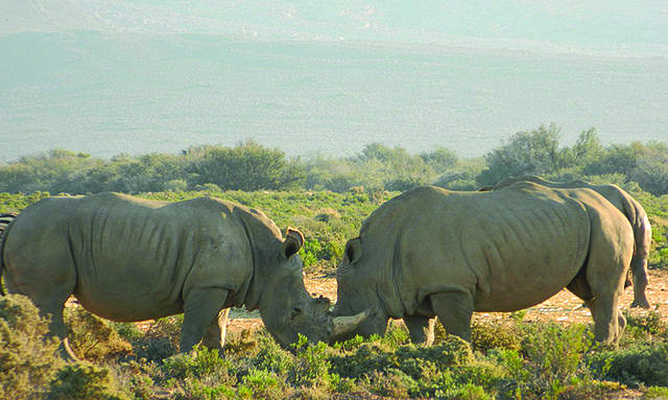
GONAREZHOU — Rhinos are to be reintroduced into Zimbabwe’s second-biggest national park even as poaching of elephants in the Gonarezhou reserve surges due to cross-river attacks.
BY GODFREY MARAWANYIKA
Within two years, 40 black rhinos will be introduced to the 5 053 square-kilometre park, which lies on Zimbabwe’s southeastern border with Mozambique, Hugo van der Westhuizen, project leader for the Frankfurt Zoological Society, said in an interview on June 5.
The society is working together with Zimbabwean wildlife authorities on the project.
“We would want to grow the number to a big number, but first we still have to address the issue of manpower on the ground,” he said in an interview at the park. “There is a lot of pressure of poachers coming from the Mozambican side.”
The animals initially became extinct in the park, whose name means ‘place of the elephant’ in the Shona language, in the 1930s and 1940s due to hunting. They were reintroduced in the 1970s but were killed by poachers with the animals vanishing from the region in the early 1990s. Today there are about 700 rhinos in other parts of Zimbabwe.
The Frankfurt Zoological Society has been working with local authorities since 2007.
Poachers from Mozambique are already preying on the park’s 11 000-strong elephant population with 25-30 killed so far this year compared with 10 in all of last year, Aaron Manyawi, a ranger at the park, said. The elephants were killed close to the border fence.
- Chamisa under fire over US$120K donation
- Mavhunga puts DeMbare into Chibuku quarterfinals
- Pension funds bet on Cabora Bassa oilfields
- Councils defy govt fire tender directive
Keep Reading

While elephants are targeted by poachers for ivory, rhinos are killed for their horns, powder from which is believed erroneously to cure cancer in south east Asia.
In South Africa’s Kruger National Park, which lies to the south of Gonarezhou, 800 rhinos were lost last year, mostly to poachers who cross the border from Mozambique.
“This year we have seen an increase in activity of poachers coming across the river” into Gonarezhou. van der Westhuizen said. “It’s a problem, but this can be solved.”
In addition to shooting animals poachers are using methods including lacing waterholes with poison, Manyawi said.
In Malilangwe Trust, a private conservancy abutting Gonarezhou populations of both black and white rhinos are protected by a team of as many as 80 rangers who regularly patrol, according to Mike Ball, who runs security at the 500 square kilometre reserve.
The constant patrols mean that the rhinos are all constantly tracked and are identified by ear notches. The population of the animals, the number of which Ball declined to reveal, is growing at 8,6% a year.
“We have had problems with poachers, but the situation is under control because of the effective conservation methods we have,” he said.
“We still believe having men on the ground is the most effective way.” — Bloomberg











